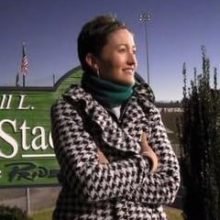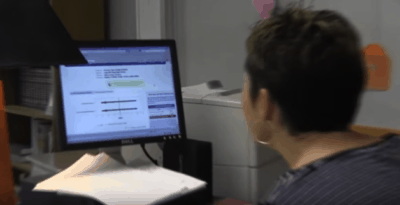Part I: Reality — What teacher evaluation is like now for veteran teachers
It’s May, and I can’t seem to get my feet to move fast enough down the hall for all I have to get done. I’ve been up grading since 3:30, have taught first period, and now I have 70 minutes of planning to take a bite off my to-do list. I run into Ms. Moore, one of our assistant principals, in the hall. Based on her raincoat, looks like she’s been chasing class cutters smoking in the woods again.
“Hey,” she says, gesturing my direction, “We need to schedule your summative evaluation. Wanna wait until after graduation? I know it’s a crazy time. But I’ve got 35 to do, so I need to get started on the bulk of them.”
I do a quick mental calculation and agree I should be one of her last.
“Ok”, she says, “but hey, send me some stuff. I know you are doing great stuff with current events, and that letter writing project, and executive teaming and collaboration. Wanna make sure I give credit where it is due.”
“Will do, “I nod. As I walk away, though, I think about the coming weeks. Need to write that last unit test, and email the special ed teachers about separate settings modifications for it. I have NC Final Exam training, graduation committee meetings, and I need to create that exam review. I have a pile of papers to grade and makeup work is flooding in. And I must touch base with parents of students that might fail my class and not graduate. My heart races at that last thought.
I resign myself to the fact that I probably won’t get around to emailing Ms. Moore anything, and like years before, we will have an awkward summative evaluation meeting, again. She has done two brief classroom observations this year, and it is evident when I finally look at my summative form that she has paid close attention and wracked her brain to consider what she has seen so she can rate me as highly as possible on the many categories. But even the greatest lesson couldn’t possible demonstrate mastery of every standard. And so her initial rating will probably underestimate my true ability.
That’s why she needs me to send her artifacts and data that will round out the picture. But the truth always comes down to this: she cares more about my form than I do. She wants me to know that she respects my work and appreciates what I do, but she is bound to only record what she observed in the relatively few moments she was in my room. There’s just not an incentive for me to spend hours pulling together a portfolio when I have so many other tasks competing for my time. And who sees my evaluation form anyways? A good or bad evaluation has no impact on my pay, advancement, hours or supervision assignments. That’s a good thing, because it would be unfair to make the instrument so consequential when it is based on so few observations. She would like to observe more- all the administrators would- but with 35 in her caseload, plus supervising 2500 students all day and dealing with discipline and twenty other areas of oversight, that’s just not possible.
While I’m glad she likes what she sees in my classroom, her classroom teaching days are over. More than wanting to impress the administration, I would like to be an agent of change, a catalyst to evolve the profession and instructional practice in other classrooms. But the current evaluation system provides none of those opportunities.
And so each May, we leave that evaluation meeting feeling a bit deflated. She feels bad that it isn’t a better reflection of my practice, and I feel bad that I care so little about that fact, and I continue to feel isolated in my “silo-ed” classroom. Another lost opportunity.
Part II: How we could leverage the current teacher evaluation system to create advanced roles for teachers and inspire professional learning
It’s May and I’m feeling the usual heat the month brings, both in the weather and in my profession. But there’s something different; I’m really excited about the professional development I have been a part of this year, and I can’t wait for Ms. Moore to see what my summative narrative report demonstrates.
It started in January of last year when our principal informed us we had been selected to participate in the pilot. Those of us who met the requirements- at least five years of teaching and being rated “accomplished” on most standards – applied to be master teachers and I was selected and recognized along with a dozen or so other colleagues. The master teachers declared which standards on the evaluation instrument we particularly specialize in, and we announced that our classrooms are open for all visitors and observers. It’s been fun to welcome guests into my classroom and has helped me stay sharp, knowing at any time I may be expected to model best practices.
Administrators still pop in when they like, but so do lots of others. They follow my blog on the shared directory where I explain what aspect of my practice I am focusing on this year, what changes I am making, and how I am gathering data to assess the effects. It’s fun to write professionally, reflect on my practice, and know that I have an authentic audience that might consult my blog, come see me teach, and replicate some of the things I am doing in a way that meets their specific professional or students’ needs.
I’ve also been assigned a cohort of teachers to lead in doing learning rounds. We are provided two professional development days each year to do learning rounds, and we also meet in the afternoons to identify areas for improvement, strategize about which classrooms we should go see, catch up on the blogs of those prospective teachers, and share our challenges and accomplishments. There are so many cross curricular and disciplinary conversations going on every day now, and I’m learning so many great strategies even as I am sharing mine. Our faculty has a growing collective understanding of many different aspects of our school, its culture, and what it is like to be a student in our school. We also have a growing respect for each other as accomplished professionals, and we all seek to be held in high regard as a result. In short, we are inspired and seek to inspire.
Being recognized as a master teacher has improved my attitude, provided new challenges as I work with my colleagues, and has given me an opportunity to be more reflective in a consistent and public way. I’m energized and can’t wait to share with Ms. Moore my blog, the progress I have seen in my students, my insights about my assigned cohort, and my ideas for next year. I think Ms. Moore is excited that the evaluation form is a springboard to a much richer conversation about teaching and learning, and one that is less dependent on her as the sole authority on my practice.
Part III: An afterword
I am aware that there are multiple pilots of advanced teaching models in progress. As a Hope Street Fellow, I was able to observe Charlotte’s Opportunity Culture Model, learn more about Project Advance in Chapel Hill, and study the other models in detail. I also served on Wake County’s committee to develop advanced teacher roles. I know none of the pilots employ the specific elements I have outlined above (learning rounds, release time and teacher-led cohorts), and I wish they did.
This pilot program principles is built upon the following basic realities:
- The current evaluation system has little utility for accomplished veteran teachers.
- That lack of utility is a huge missed opportunity.
- The current evaluation system is creating an untenable administrative and managerial burden for our school administrators.
- There are ways we could adapt the usage of the current teacher evaluation instrument to better serve the needs of teachers and encourage greater innovation in instructional practice.
- Those adaptations could be done relatively quickly and without great expense, but any reform will fail if it does not provide some time away from teaching for observation, reflection and planning.
It is my hope that with your interest and support, we can consider how to leverage the expertise of our most accomplished veteran teachers to inspire professional learning and instructional innovation in all our schools in NC.


